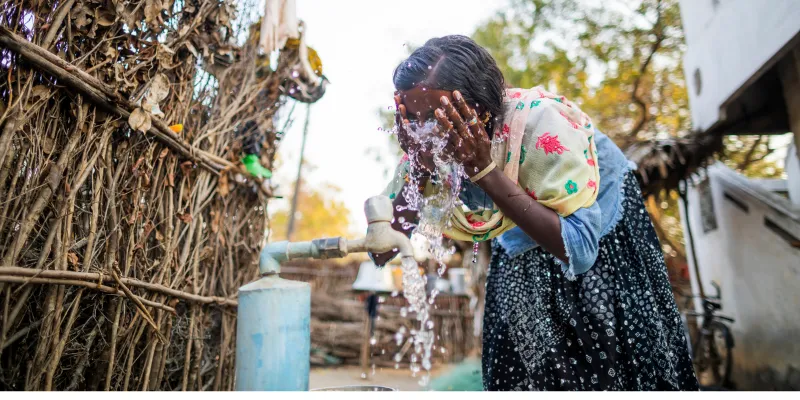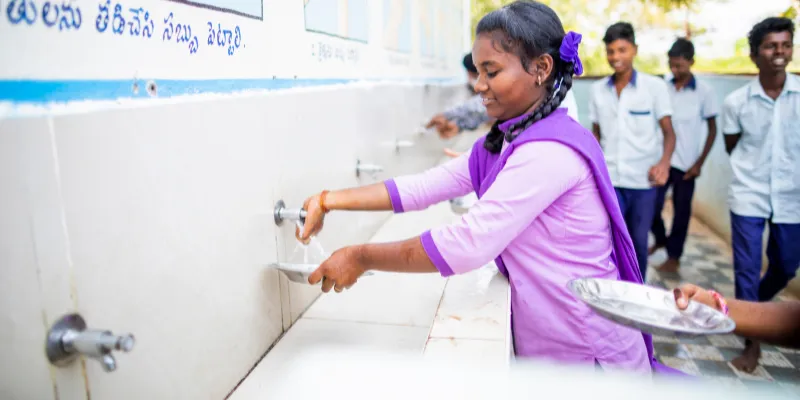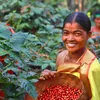How these young girls are aiding water conservation efforts in Satyavedu, an industrial hamlet in Andhra Pradesh
For World Water Week, we feature the stories of 15-year-old Vyshnavi and 20-year-old Shashirekha, who ensure water conservation after an intervention by PepsiCo Foundation-WaterAid brought potable water to Satyavedu in Andhra Pradesh.
Sixty kilometres away from bustling Chennai lies Satyavedu, a tiny, industrial hamlet nestled on the border between Tamil Nadu and Andhra Pradesh. With a population of 52,000, it is home to marginal farmers, agricultural labourers and daily wage earners.
With the average temperature in summer hovering around 42 degrees, water is scarce in this region. When wells dry, women trudge for kilometres to find potable water for their daily needs and open wells to source water for cooking and bathing.
This acute water shortage had severe consequences. Girls had to drop out of school because there was no water.
Challenges of water scarcity
One of them was Shashirekha, who is from a village in Satyavedu with an acute water shortage. She had to help her parents fetch water all the time.
“My village has 50 households, largely comprising kaccha houses with thatched roofs. About five years back, the local panchayat committee had installed a hand pump in the village for all the residents. Still, due to its disrepair, the hand pump would run dry in the tough summer months, and each family member would take turns to fetch the water to face acute water shortage,” she tells HerStory.

Shashirekha enjoying water in her village.
Shashirekha had to drop out of school after class 10 to help her parents, who work in a pharmaceutical company. She had to miss work too because she and her brother had to walk miles to fetch water for daily needs.
Vyshnavi, a bright 15-year-old, had to miss many classes because of the lack of basic sanitation facilities, period friendly washrooms and access to safe water.
A student of class 11 at the Zilla Parishad School in Rajagopalapuram, 18 km away from Satyavedu, Vyshnavi, says, “During my periods, I had no choice but to miss my school and stay at home. There was no running water in the taps in the toilet, and we did not even have a separate washroom for girls. It didn’t feel safe, and I felt uncomfortable going to school during my periods. I was forced to miss classes for years, and couldn’t follow what was taught in class. As a result, my studies suffered a lot.”
The students had to walk almost 300 metres to a nearby village to access a drinking water point, through a hand pump. This resulted in several health problems as the water was not conducive for drinking.
Vyshnavi not attending school also made a dent in the family income as on days she missed classes, her mother could not leave her alone at home. This, in turn, affected the monthly household income.
Access to safe water

Vyshnavi at her school
But all these are a thing of the past now. In partnership with WaterAid India, PepsiCo Foundation ran an intervention with gram panchayats to address water shortage in schools, anganwadis and villages.
Viraj Chouhan, Chief Govt. Affairs and Communications Officer, PepsiCo India explains, “As part of the project, PepsiCo Foundation and WaterAid has implemented several solutions to increase access to safe water, including restoring wells, harvesting rainwater in schools, and building piped water supply systems for household-level access to safe water. Increased access to clean water has a critical impact on the health and security of residents, particularly women, who otherwise have to walk long distances to collect water, which is physically challenging and can hinder access to employment opportunities as well as spending quality time with the families.”
In addition, to creating community water infrastructure, the focus has been on institutional capacity building of the communities to take care of Operations & Maintenance (O&M) of the developed infrastructure, driving sustainability.
Shashirekha’s village has seen a drastic transformation since this intervention.
“There is piped water connection in every household, and sufficient water for each hut for bathing, cooking, and washing. A new bore well was dug in the village and connected to an overhead storage tank linked to every hut through a pipeline network. In each hut, a stand post and platform have been constructed to collect water. This allowed everyone to spend less time fetching water from the nearby pond or open wells and focus on earning a better livelihood for themselves,” she says.
Apart from access to water in the school, Vaishnavi says that girls are trained on safe menstrual hygiene practices, and even the teachers and students have been sensitised about adopting proper personal hygiene measures like washing hands after using the toilet and before eating.
Both Shashirekha and Vyshnavi are now champions of water conservation – the latter has received training in operating a motor pump and cleaning the bore well, store reservoir, and water stand post and technical training in plumbing like fixing taps and pipe joints, among other things.
Water conservation efforts
Vyshnavi was appointed as the Minister for Girl’s protection in the School Cabinet Committee, which actively addresses girls' concerns regarding water availability and access.
As a member of the village user committee, Shashirekha also handles and discusses water-related issues around operation and maintenance and helps the other community members.
“As the Minister for Girl’s protection, I discuss girls’ needs and problems in the School Cabinet Committee, especially the ones regarding water availability and access. Through the committee, we support other girls to communicate their issues/problems to the teacher and get them rectified.
I am also trained in safe menstrual Hygiene Management (MHM) and conduct orientation sessions with my fellow girl students,” says Vyshnavi.
According to Viraj, the programme has benefitted over 2.8 million people locally. The interventions in the project locations have enabled harvesting of over 185 million litres of water through rainwater harvesting and recharging of around 2300 million litres of groundwater by year-end 2020. As part of the programme, hygiene sessions have also been organised for driving WASH (Water, Sanitation and Hygiene) awareness through mass public engagement campaigns with individual communities, schools, and community institutions.
Shashirekha’s commitment to the project is admirable. “My only goal now is to strengthen this user committee for operation and maintenance related work. We have already opened a bank account and have started pooling in our collective money for any repairs and maintenance.”
Meanwhile, Vyshnavi dreams of becoming an officer in the Agricultural Department and serve agricultural communities in Satyavedu Mandal to profit from the land and become prosperous.
Their lives and dreams have changed forever – because tiny drops of water make a mighty ocean of difference indeed.
Edited by Anju Narayanan








